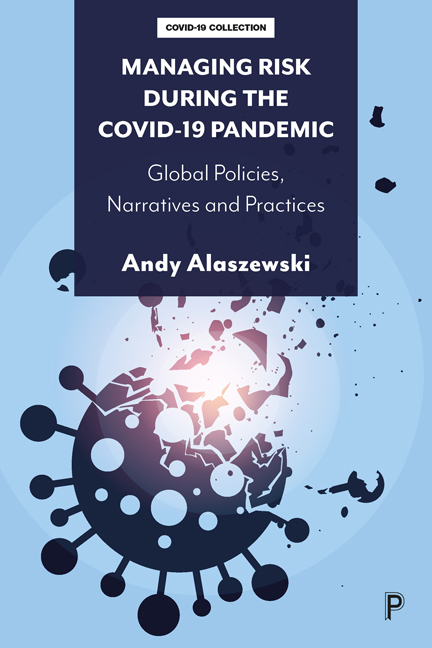Book contents
- Frontmatter
- Dedication
- Contents
- List of tables
- List of abbreviations
- About the author
- Acknowledgements
- Foreword
- Preface
- 1 Introduction: risk as a key feature of late modern societies
- PART I Responding to the challenges of the pandemic
- PART II Mitigating risk through science and technology
- PART III Risk narratives
- References
- Index
5 - ‘Following the science’: expertise and risk
Published online by Cambridge University Press: 20 January 2024
- Frontmatter
- Dedication
- Contents
- List of tables
- List of abbreviations
- About the author
- Acknowledgements
- Foreword
- Preface
- 1 Introduction: risk as a key feature of late modern societies
- PART I Responding to the challenges of the pandemic
- PART II Mitigating risk through science and technology
- PART III Risk narratives
- References
- Index
Summary
Using experts and expertise to identify and manage risk
Governments in modern democratic societies accept that one of their primary roles is to protect their citizens. As the inquiry into the failure of the UK government to prevent BSE infecting humans noted most of the public believe that it is the government's role to minimise the hazards they are exposed to and ‘the Government should do all that is reasonably practicable to see that the food that they eat and the medicines that they take are reasonably safe’ (BSE Inquiry, 2000, para 1291). To provide such protection, the government needs to draw on experts’ knowledge to identify the risks and decide how to mitigate them (HM Treasury, 2005, p. 45).
In normal times, this process tends to take place behind closed doors and attracts relatively little media and public attention. However during the COVID-19 pandemic, experts took on a more prominent and public role. In making decisions that impacted on the lives of all citizens, often in quite novel ways, politicians claimed to be ‘following the science’, and experts often legitimated these decisions, endorsing them in public forums such as televised briefings.
The institutional structure of science and scientists
Scientists play a key role in developing the knowledge and technologies that underpin modern societies. They work in a variety of settings, ranging from commercial enterprises such as pharmaceutical companies to charities and government-funded institutions, especially universities.
Low-and middle-income countries
Despite the limitations of government funding and institutional infrastructures, some countries have either developed their own specialist institutions or collaborated in multinational institutions.
Nigeria, one of the largest and most populous African countries, has a well-developed university sector and its own public health centre, the Nigeria Centre for Disease Control and Prevention (2022). This was established in 2011, being supported by the Federal Ministry of Health and other state bodies together with international partners. During the pandemic, the Nigerian CDC issued guidance on COVID-19 infection control for all health-care workers, managers and infection control teams as well as more general advice to the public.
- Type
- Chapter
- Information
- Managing Risk during the COVID-19 PandemicGlobal Policies, Narratives and Practices, pp. 67 - 85Publisher: Bristol University PressPrint publication year: 2023



